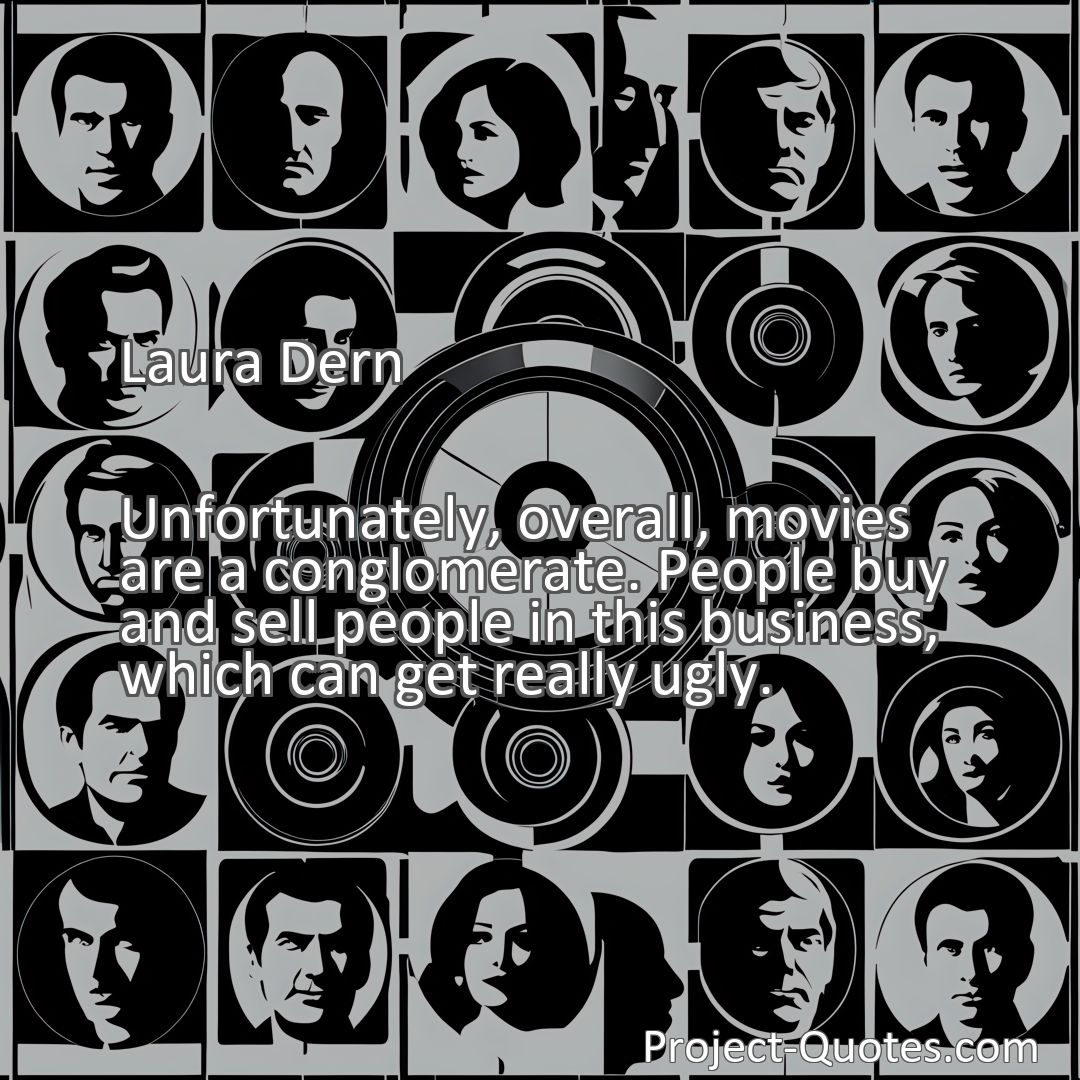Unfortunately, overall, movies are a conglomerate. People buy and sell people in this business, which can get really ugly.
Laura Dern
Unveiling the Ugly Truth: How the Film Industry Buys and Sells People Behind the Scenes Discover the hidden reality behind the glitz and glamour of Hollywood as renowned actress Laura Dern reveals, “People buy and sell people in this business, which can get really ugly.” From exploitative power imbalances to objectification, the film industry can be a harsh world. However, recent awareness, advocacy, and initiatives aim to confront these issues and create a more equitable and respectful environment.
Table of Contents
- 1 Unfortunately, overall, movies are a conglomerate. People buy and sell people in this business, which can get really ugly.
- 2 Laura Dern
- 3 Meaning of Quote – Unfortunately, overall, movies are a conglomerate. People buy and sell people in this business, which can get really ugly.
- 4 Freely Shareable Quote Image
- 5 Related
Meaning of Quote – Unfortunately, overall, movies are a conglomerate. People buy and sell people in this business, which can get really ugly.
Movies are undoubtedly a popular form of entertainment that has captivated audiences for decades. From the classic black and white films to the modern blockbusters, the world of cinema continues to thrive and evolve. However, beneath the glitz and glamour lies a harsh reality that Hollywood often hides from the public eye. In the words of renowned actress Laura Dern, “Unfortunately, overall, movies are a conglomerate. People buy and sell people in this business, which can get really ugly.”
While we may watch movies simply for the enjoyment they bring, it is important to recognize the complex web of transactions, negotiations, and power dynamics that occur behind the scenes. The film industry, like any other business, operates on the principles of supply and demand. Producers invest substantial amounts of money in the hopes of creating a successful film that will rake in profits. Actors, on the other hand, are the driving force behind these projects, lending their talents and star power to attract audiences. In this interconnected world, both parties are dependent on each other, but, as Dern suggests, this can lead to some unsavory practices.
One of the aspects that make this industry susceptible to such behavior is the inherent power imbalance that exists between producers and actors. While producers typically hold the financial resources and decision-making authority, it is the actors who often fuel the box office success of a film. This power dynamic can create a fertile ground for exploitation, especially when actors are desperate for opportunities or eager to make a breakthrough in their careers. The allure of fame and fortune can blind aspiring actors, making them vulnerable to unscrupulous industry practices.
Moreover, the rise of social media has further complicated the buying and selling aspect of the movie business. With the ability to instantly share and promote projects, actors have become even more like commodities in the eyes of producers. In the pursuit of higher profits, actors are marketed like products, often reducing them to mere objects rather than individuals with unique talents and aspirations. This dehumanization of actors contributes to the “ugliness” that Dern speaks of, as the industry prioritizes financial gain over genuine artistic expression and respect for human dignity.
However, it is crucial to note that not all transactions within the film industry are negative. Many actors willingly participate in the business aspect of their craft, engaging in negotiations and endorsing brands that align with their personal values. This active involvement allows actors to maintain some level of control over their careers and helps to ensure that they are not strictly treated as commodities. Additionally, the buying and selling aspect can also create opportunities for actors to secure higher salaries, gain exposure, and explore diverse roles. Therefore, it is important to strike a balance between recognizing the industry’s flaws while also acknowledging the positive aspects that exist within it.
Furthermore, the issue of buying and selling people also extends to the concept of typecasting within the movie industry. Typecasting refers to the practice of repeatedly casting an actor in similar roles based on their physical appearance, personality traits, or previous successful performances. While typecasting can be advantageous for an actor in terms of job stability and recognition, it can also be limiting and prevent actors from exploring their full potential.
Often, actors find themselves stuck in a particular role or image, struggling to break free from the constraints imposed by an industry that prefers familiarity over versatility. This not only hampers their growth as performers but also perpetuates stereotypes and restricts the diverse range of stories that can be told. In this sense, the industry’s propensity to buy and sell people can be seen as a barrier to artistic development and the exploration of new narratives.
Fortunately, recent years have witnessed a growing awareness of these problematic practices within the film industry. Advocacy groups and actors themselves have started speaking out against exploitation, inequality, and the objectification of individuals in the pursuit of profit. The #MeToo movement, for example, has shed light on the dark underbelly of Hollywood, uncovering instances of abuse and discrimination that have long been swept under the rug. These efforts have sparked a dialogue and forced the industry to confront its flaws.
Moreover, initiatives such as diversity and inclusion programs have emerged to mitigate the issue of typecasting and promote a more inclusive and representative industry. By championing the importance of diverse storytelling and challenging traditional norms, these programs have opened up opportunities for actors from marginalized communities to showcase their talents and break free from the confines of stereotype-driven casting.
In conclusion, Laura Dern’s poignant quote shines a light on the underbelly of the film industry, where people are bought and sold like commodities. While this reality may appear disheartening, it is essential to recognize that the industry’s flaws can be addressed through awareness, advocacy, and an active effort to foster change. By acknowledging the power dynamics, the consequences of typecasting, and the dehumanization of actors, we can work together to create a more equitable and respectful environment for all those involved in the magical world of cinema.
I hope this quote inspired image brings you hope and peace. Share it with someone who needs it today!


